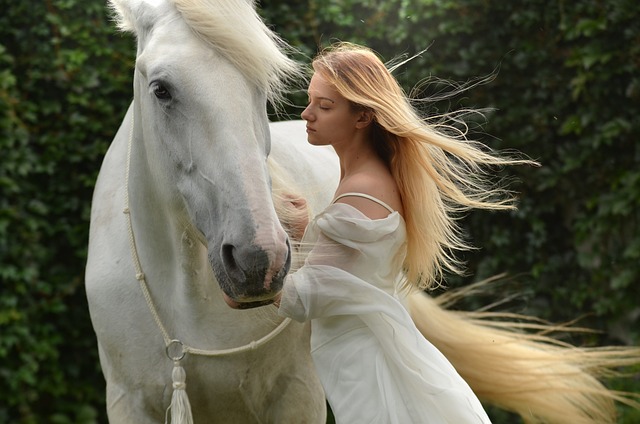Spis Treści
Can Horses Sense Fear in a Rider?
When it comes to horseback riding, the relationship between the rider and the horse is of utmost importance. Horses are incredibly perceptive animals, known for their ability to sense and react to subtle cues from their surroundings. One common belief among riders is that horses can sense fear in their riders. In this article, we will explore this topic in detail and answer the question: Can horses sense fear in a rider?
Understanding Horse Behavior
Before delving into whether horses can sense fear in a rider, it is essential to understand some basics about horse behavior. Horses are highly social animals with a strong herd instinct. They have evolved to be acutely aware of their environment and the emotions of those around them. This heightened sensitivity allows them to survive in the wild and form strong bonds with their human counterparts.
The Power of Body Language
Horses are masters at reading body language, both from their fellow herd members and humans. They can pick up on subtle cues such as facial expressions, posture, and even the tiniest shifts in weight distribution. This ability to interpret body language is crucial for their survival in the wild, as it helps them understand the intentions and emotions of other animals.
When it comes to horseback riding, the rider’s body language plays a significant role in communicating with the horse. Horses are incredibly responsive to the rider’s movements and can sense even the slightest changes in their posture and energy. This sensitivity allows them to understand the rider’s intentions and respond accordingly.
The Link Between Fear and Body Language
Fear is a powerful emotion that can have a profound impact on our body language. When we experience fear, our heart rate increases, our breathing becomes shallow, and our muscles tense up. These physical changes are often accompanied by visible signs such as widened eyes, a rigid posture, and a trembling voice.
Research has shown that horses are highly attuned to these fear-related cues in humans. They can pick up on the subtle changes in body language that occur when a person is afraid. This ability is not limited to fear alone; horses can also sense other emotions such as anxiety, stress, and even excitement.
How Horses React to Fear in Riders
When a horse senses fear in its rider, it can trigger a range of responses. These responses can vary depending on the individual horse’s temperament, training, and past experiences. Here are some common reactions that horses may exhibit when they sense fear in their riders:
- Heightened Alertness: Horses may become more alert and attentive, scanning their surroundings for potential threats.
- Increased Nervousness: Some horses may become more nervous or skittish when they sense fear in their riders. They may startle easily or become more reactive to external stimuli.
- Loss of Confidence: In some cases, horses may interpret their rider’s fear as a sign of danger. This can lead to a loss of confidence in the horse, making them more hesitant or resistant to certain cues.
- Mirroring Emotions: Horses are known for their ability to mirror the emotions of those around them. If a rider is fearful, the horse may also become anxious or fearful.
- Trust Issues: Fear in a rider can erode the trust between the horse and the rider. Horses rely on their riders for guidance and reassurance, and when they sense fear, it can undermine their confidence in the rider’s ability to keep them safe.
Managing Fear as a Rider
While it is natural for riders to experience fear at times, it is essential to manage and overcome it for a harmonious partnership with your horse. Here are some strategies to help you manage fear as a rider:
- Education and Training: Enhancing your knowledge and skills through proper education and training can boost your confidence as a rider. Understanding horse behavior, learning effective communication techniques, and practicing various riding scenarios can help you feel more secure in the saddle.
- Positive Visualization: Visualizing successful rides and positive outcomes can help reframe your mindset and reduce fear. Imagine yourself riding confidently and calmly, and focus on the joy and connection you experience with your horse.
- Breathing and Relaxation Techniques: Deep breathing exercises and relaxation techniques can help calm your mind and body. When you are relaxed, your horse is more likely to respond positively to your cues.
- Building Trust: Building a strong bond and trust with your horse is crucial. Spend time on the ground, engaging in grooming, groundwork, and bonding exercises. This will help establish a foundation of trust and mutual respect.
- Seeking Professional Help: If fear is significantly impacting your riding experience, consider seeking guidance from a qualified instructor or trainer. They can provide personalized support and help you work through your fears in a safe and controlled environment.
Conclusion
In conclusion, horses are incredibly perceptive animals that can sense fear in their riders. Their ability to read body language and interpret emotions allows them to respond to their rider’s cues and intentions. When a horse senses fear in its rider, it can trigger various reactions, including heightened alertness, increased nervousness, and a loss of confidence. Managing fear as a rider is essential for maintaining a harmonious partnership with your horse. By enhancing your knowledge, practicing relaxation techniques, and building trust, you can overcome fear and develop a strong and confident riding relationship with your horse.


















